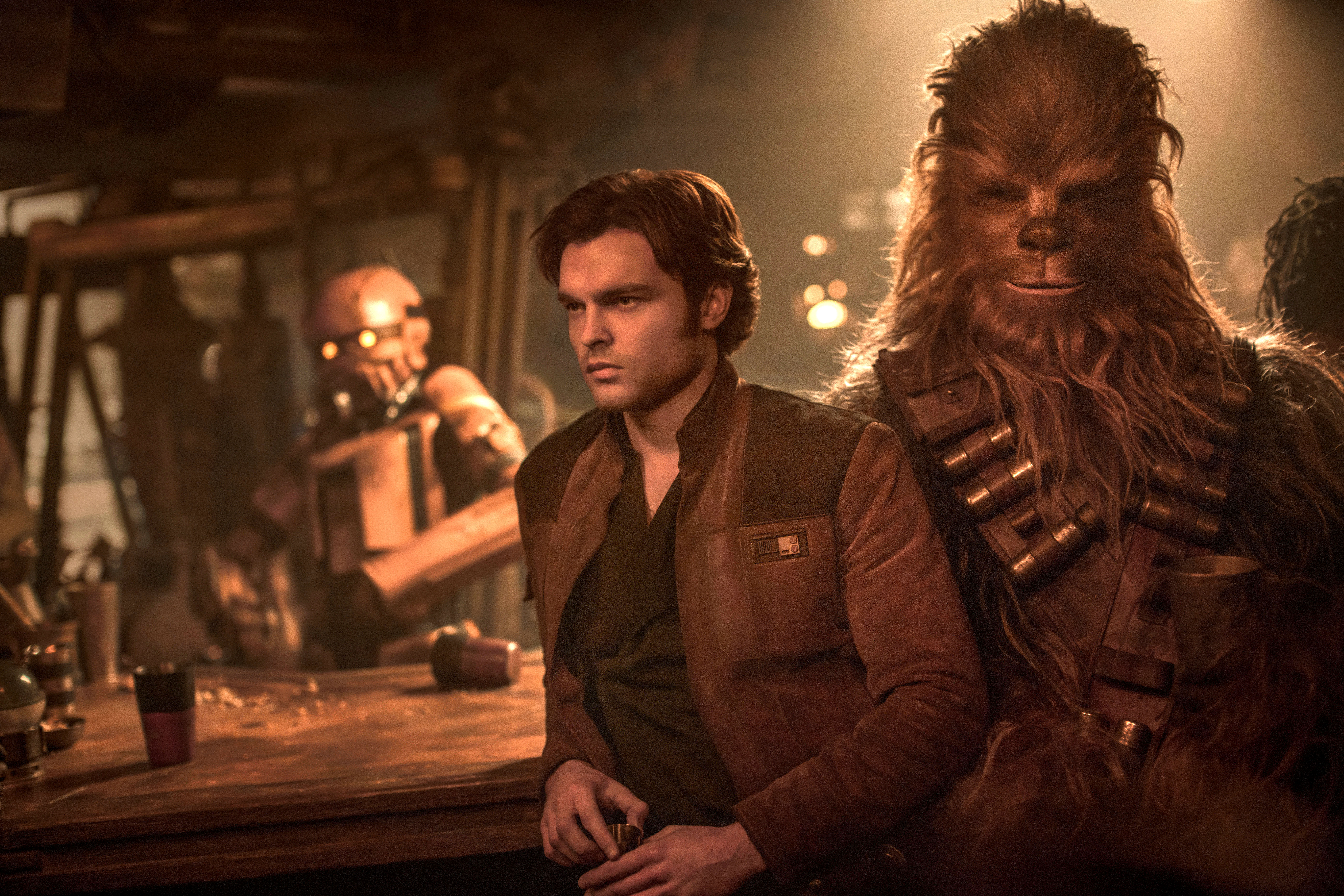Solo marks Star Wars' return to sleaze
Hutt! Hutt!


A free daily email with the biggest news stories of the day – and the best features from TheWeek.com
You are now subscribed
Your newsletter sign-up was successful
The newest entry in the Star Wars series, Solo: A Star Wars Story, has something that other recent entries lacked: sleaze.
This is a relative term, of course. The Star Wars universe continues to be largely devoid of sex, as well as any violence bloody enough to threaten its PG-13 rating. But many of the earlier Star Wars pictures were able to at least create the illusion of sci-fi sleaziness with their glimpses at various facets of the galaxy's criminal underworld.
Han Solo, the titular protagonist of the latest entry, is a major part of this, not because he's a criminal (though technically he is) but because he's first introduced in the original Star Wars in the Mos Eisley cantina, a favored watering hole in that "wretched hive of scum and villainy" and the setting of what became a signature scene for the series. There are few evident heroes in the cantina, and many shady characters of questionable morals; no matter who fires first, Han and bounty hunter Greedo get into a small-scale shootout ending in Greedo's death, and none of the other patrons seem to care.
The Week
Escape your echo chamber. Get the facts behind the news, plus analysis from multiple perspectives.

Sign up for The Week's Free Newsletters
From our morning news briefing to a weekly Good News Newsletter, get the best of The Week delivered directly to your inbox.
From our morning news briefing to a weekly Good News Newsletter, get the best of The Week delivered directly to your inbox.
Later episodes would return to this vision of a galaxy with shady corners. Return of the Jedi opens with a long sequence centered on Star Wars sleaze ambassador Jabba the Hutt, and prequel The Phantom Menace forces the Jedi to negotiate with gambling-addicted slave owner Watto to repair their ship and free young Anakin Skywalker. But when The Force Awakens nods to the original film's cantina scene, it's an act of homage, not an exploration of a seedy underbelly, and The Last Jedi is more concerned with a different sort of amoral character — the richer patrons of the casino on Canto Bight.
Solo: A Star Wars Story, though, has almost nothing to do with the Jedi or the Force, and almost all of it is set on planets with some degree of lawlessness or corruption. Han begins the movie as an almost Oliver Twist-like figure, running low-level jobs for a wormy crime boss and orphan-lord. As promised by earlier Star Wars films, he eventually plays cards with the charming, slick, unscrupulous Lando Calrissian (Donald Glover, staying true to the character's larceny by stealing scenes). Cinematographer Bradford Young shoots many of these planets in low light, accentuating their grubbiness and one-upping the "used" aesthetic George Lucas insisted on applying to the original films.
Solo is not thematically challenging like The Last Jedi, or as gee-whiz charming as The Force Awakens, but chief among its many delights is its journeys into corners of the Star Wars universe where hardly anyone even flicks on a lightsaber, let alone does battle with one. This is a messier and often more mysterious look at this world, where the bad guys are more mean and avaricious than galactically evil. It's a welcome return; characters like Jabba or Watto or the menacing bounty-hunter lineup of Empire Strikes Back made the universe feel more viscerally lived-in, with lives that don't hinge on Jedi-Sith or even Empire-Rebel conflicts.
Yet — without getting into full spoiler territory — Solo can't completely avoid the brewing conflict between the Empire and the Rebel Alliance (it's set about a decade before the events of the original film). That makes sense, but it's also something of a disappointment. As shepherded by consummate company man Ron Howard, Solo feels too distracted by the stakes of its predecessors to fully throw itself into the Star Wars underworld. None of the creatures, for instance, make the same impression as the immense Jabba the Hutt, with his grotesquely wagging tongue and low, sinister laugh.
A free daily email with the biggest news stories of the day – and the best features from TheWeek.com
Still, Solo does an admirable job of imagining some new-yet-dingy corners of the universe, and it's chockablock with instant-classic Star Wars details, like the creepy head in a jar that sings back-up at a villain-packed club, or the light-allergic giant worm that menaces Han early in the film. The fan-service references are a lot of fun, too. It's just a shame that even 10 movies in, when Star Wars dips into the underworld, it always feels obligated to come back up for fresh air.
Jesse Hassenger's film and culture criticism has appeared in The Onion's A.V. Club, Brooklyn Magazine, and Men's Journal online, among others. He lives in Brooklyn, where he also writes fiction, edits textbooks, and helps run SportsAlcohol.com, a pop culture blog and podcast.
-
 Local elections 2026: where are they and who is expected to win?
Local elections 2026: where are they and who is expected to win?The Explainer Labour is braced for heavy losses and U-turn on postponing some council elections hasn’t helped the party’s prospects
-
 6 of the world’s most accessible destinations
6 of the world’s most accessible destinationsThe Week Recommends Experience all of Berlin, Singapore and Sydney
-
 How the FCC’s ‘equal time’ rule works
How the FCC’s ‘equal time’ rule worksIn the Spotlight The law is at the heart of the Colbert-CBS conflict
-
 Walter Isaacson's 'Elon Musk' can 'scarcely contain its subject'
Walter Isaacson's 'Elon Musk' can 'scarcely contain its subject'The latest biography on the elusive tech mogul is causing a stir among critics
-
 Welcome to the new TheWeek.com!
Welcome to the new TheWeek.com!The Explainer Please allow us to reintroduce ourselves
-
 The Oscars finale was a heartless disaster
The Oscars finale was a heartless disasterThe Explainer A calculated attempt at emotional manipulation goes very wrong
-
 Most awkward awards show ever?
Most awkward awards show ever?The Explainer The best, worst, and most shocking moments from a chaotic Golden Globes
-
 The possible silver lining to the Warner Bros. deal
The possible silver lining to the Warner Bros. dealThe Explainer Could what's terrible for theaters be good for creators?
-
 Jeffrey Wright is the new 'narrator voice'
Jeffrey Wright is the new 'narrator voice'The Explainer Move over, Sam Elliott and Morgan Freeman
-
 This week's literary events are the biggest award shows of 2020
This week's literary events are the biggest award shows of 2020feature So long, Oscar. Hello, Booker.
-
 What She Dies Tomorrow can teach us about our unshakable obsession with mortality
What She Dies Tomorrow can teach us about our unshakable obsession with mortalityThe Explainer This film isn't about the pandemic. But it can help viewers confront their fears about death.
